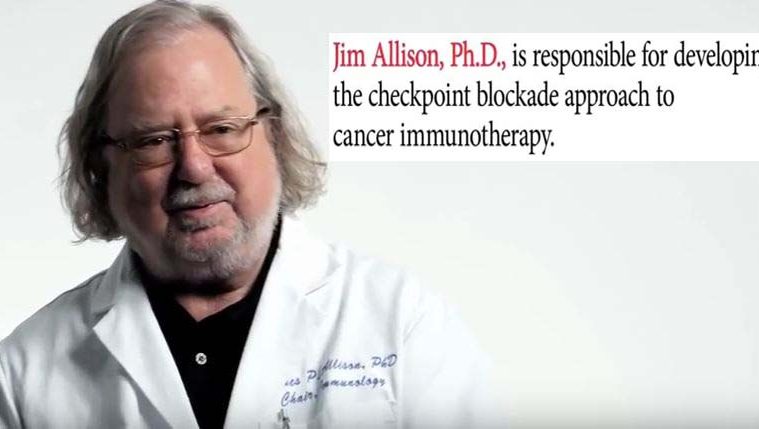Inventor of immune checkpoint blockade for cancer makes prestigious annual list
HOUSTON — The University of Texas MD Anderson Cancer Center Chair of Immunology Jim Allison, Ph.D., whose pivotal insight to attack cancer by treating the immune system instead of the tumor revived cancer immunotherapy, has been named to the 2017 TIME 100. His approach launched a completely new way to treat these diseases, improving patient outcomes and transforming the course of cancer research.
The list, now in its 14th year, recognizes the world’s most influential individuals. As TIME Editor-in-Chief Nancy Gibbs has said of the list: “Each year our TIME 100 list lets us step back and measure the forces that move us…. One way or another they each embody a breakthrough: they broke the rules, broke the record, broke the silence, broke the boundaries to reveal what we’re capable of.”
Allison’s breakthrough, stemming from his basic science research, liberates the immune system to find and destroy cancer cells – an approach called immune checkpoint blockade. This new class of drugs is saving the lives of significant numbers of patients with a variety of advanced cancers.
“I’m grateful to TIME for recognizing the increasing importance of immunotherapy as a new pillar of cancer treatment,” said Allison, who also is executive director of the Immunotherapy Platform at MD Anderson. “We’re in the early days of successful cancer immunotherapy. Our next step is to extend these treatments to benefit more patients and our platform is intensely focused on making that a reality.”
MD Anderson’s Immunotherapy Platform analyzes blood samples and tumor biopsies taken before, during and after treatment to better understand response and resistance to treatment. The platform is part of the institution’s Moon Shots ProgramTM, which is designed to harness scientific knowledge and develop new technologies that will dramatically reduce cancer deaths through prevention, early detection and treatment.
Basic science built immune checkpoint blockade
“We’re pleased to see the impact of Jim’s research accomplishments highlighted alongside those of other great pioneers and icons, and to have a second researcher on the TIME 100 list,” said MD Anderson Ad Interim President Marshall Hicks, M.D. “We’re delighted to have Jim leading our platform efforts, which are crucial to our Moon Shots Program and
MD Anderson’s ability to advance progress in this exciting field.”
Allison’s curiosity-driven research, funded in early days by the National Institutes of Health, led to a life-saving treatment approved for six late-stage cancers and in hundreds of clinical trials for additional cancers and earlier stages of disease.
“It is important to note that immune checkpoint blockade came from understanding the basic science of the immune system,” Allison said. “I didn’t set out as a young scientist to develop cancer therapies, but to understand T cells, these amazing cells that travel our bodies to protect us from disease.”
Allison’s research in T cells – the immune system’s targeted weapons against viruses, bacteria and abnormal cells – began during his first stay at
MD Anderson in the 1970s and ‘80s, extending to other institutions before Allison returned to MD Anderson in 2012 to establish the platform.
He was co-discoverer of the function of a protein on T cells that acts as a brake, shutting down immune response. His pivotal idea was to block the brake on the T cell, called CTLA4, with an antibody, unleashing the T cells to attack. After demonstrating this approach in mouse models of human cancer, Allison advocated taking the approach to human clinical trials, which led to the development of ipilimumab, known commercially as Yervoy.
Ipilimumab leads the way
Yervoy was approved for advanced melanoma by the U.S. Food and Drug Administration in 2011, after it became the first drug ever shown in a clinical trial to extend the lives of people with metastatic melanoma. Follow-up studies showed that 22 percent of patients treated with the drug in clinical trials survived 10 years or longer, unprecedented results for the disease.
After Allison’s research and the development of ipilimumab created the field of checkpoint blockade, other drugs were developed to block another brake on T cells called PD1, which have been approved for melanoma, Hodgkin lymphoma, and lung, kidney, bladder and head and neck cancers.
“The next challenge is to understand who benefits from treatment, who doesn’t, and develop rational combination therapies to help those who don’t,” Allison said. “There are many possible combinations – with other immunotherapies, targeted therapies, chemotherapies, radiation – and basic science will be important to help us more efficiently sort out these options.”
Allison holds the Vivian L Smith Distinguished Chair in Immunology and is director of the Parker Institute for Cancer Immunotherapy at MD Anderson.
Allison has won a number of honors in recent years, including the 2015 Lasker-DeBakey Clinical Medical Research Award, the 2014 Breakthrough Prize in Life Sciences and the 2013 AACR-Cancer Research Institute Lloyd J. Old Award in Cancer Immunology. He’s a member of the National Academy of Sciences, the National Academy of Medicine, a fellow of the American Association for Cancer Research Academy, the American Academy of Microbiology, the American Association for the Advancement of Science and the American Academy of Arts and Sciences.
Former MD Anderson chair of Lymphoma and Melanoma Larry Kwak, M.D., Ph.D., also made the list in 2010 for his research on cancer vaccines.

